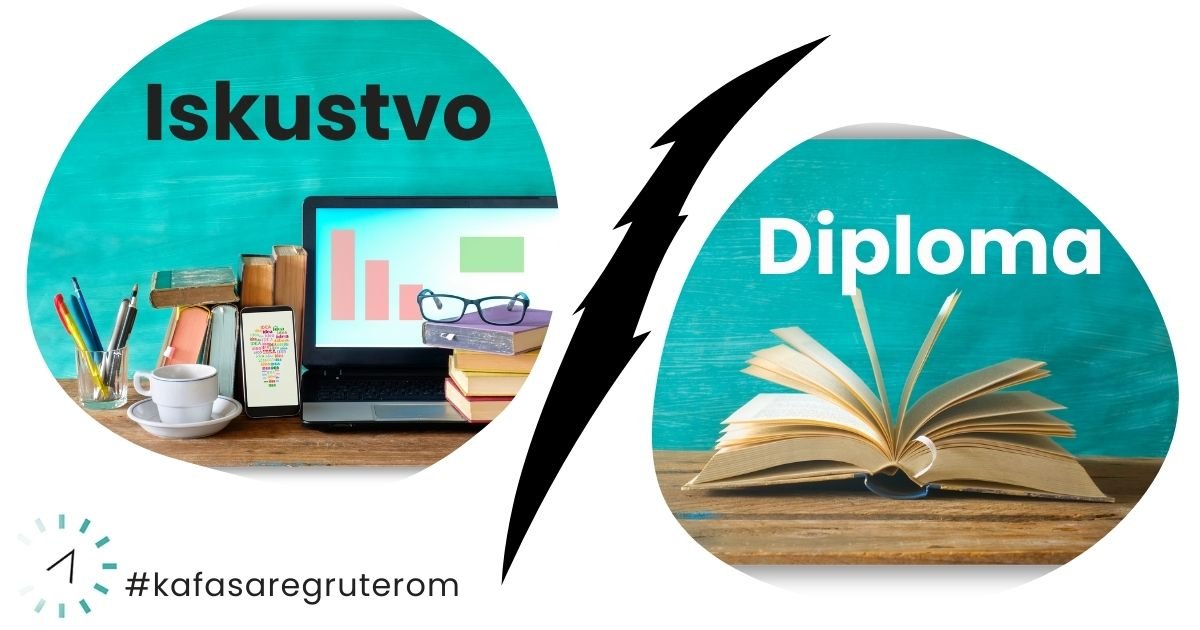ATTENTION: This text pertains to what employers value more during hiring (though the real gem is hidden towards the end).
If you are here to find out whether to place a degree or experience first on your CV, we invite you to watch the video lessons on the Jobiri platform. Additionally, with our CV maker, you won't need to think about it because we already have templates and phrases you can use to write your CV in just 30 minutes!
Once upon a time, there were Petar and Marko.
Petar and Marko didn't know each other, but they applied for the same job.
Petar studied diligently and earned a college degree, which was listed as a requirement in the job advertisement, but he has no experience in his field.
Marko is an individual who can bring 15 years of experience to the company, but he does not possess the required degree.
During the interview with the employer, both gave their best and proved to be excellent candidates.
Question: Who would you hire?
I'm sure you thought you didn't have enough information to answer this question, didn't you?
Exactly.
A degree and experience are just pieces of a much larger puzzle.
There is no universal answer to what employers want, as not only is each organization different, but every recruiter is unique in their own way. In some fields, experience is favored, while in others, educational background is most important.
For instance, in sales, it is much more important to provide insight into your achievements, or in layman's terms, to explain how much money you are worth.
On the other hand, if you are a doctor, data scientist, or programmer, your degree and the projects you worked on during your studies will certainly be valued. Thus, the field of your interest dictates how your educational background and experience compete.
However, let's be honest, almost always the advantage lies in the experience you gain. When someone earns a degree from a particular university, it means they have understood a concept. But, it is only through practice that an individual can develop the ability to apply knowledge in real-world situations.
In many industries, employers look for candidates who can immediately "hit the ground running" and contribute to the organization, making experience crucial here. Someone with experience has already faced real-world challenges and learned how to overcome them, thus having a proven track record.
Additionally, the job market is becoming increasingly competitive, and employers are often overwhelmed with applications from highly qualified candidates with similar degrees. In this environment, experience can be the critical difference that sets a candidate apart from the crowd.
What should you do if you have a degree but no experience? Or, by some chance, you have neither?
(now comes that gem from the beginning of the story!)
1. Start learning
I know you thought learning stopped after school, but you were mistaken – the real learning only begins then!
Create a profile on Udemy, courses are generally very affordable. Also, Coursera, edX or Udacity are something you don't want to miss.
Purchase Masterbox if you like digital marketing.
Engage Dragana if you want to learn how to monetize your language skills.
Follow YouTube channels that are relevant to your industry, as well as others such as Ted-ed, KhanAcademy, Impact Theory etc.
Listen to industry podcasts, something we didn't have in my time 🙂
Join forums, Facebook and LinkedIn groups, and professional organizations to learn about the latest industry trends and connect with professionals.
2. Volunteer
Although in the mountainous Balkans volunteering is often equated with exploiting labor that works for free, volunteering is actually an excellent way to gain practical experience in a field.
Many organizations offer internships or volunteer opportunities that allow you to work alongside experienced professionals and learn on the job. If you set clear boundaries and seek opportunities to bring out your best, volunteering can lead you to your first professional job.
One of the best websites for volunteers is WorldPackers, check it out.
When I was at my first strategizing retreat FitCampI met two people who came to Montenegro through this platform during my first strategizing retreat. He is an American who is navigating his career between nutrition, programming, and sales. Professional habit kicked in, so naturally, I bombarded him with ideas. She is from Venezuela, doesn't speak English, and finds it adorable that my Spanish is at the level of "Yo soy tu madre!" They came to earn some money, meet new people, and travel the world!
Two more volunteers from Chile joined the team at Ski Centre Vučje last month. Check out their experiences here.
3. Build a portfolio
Building a portfolio is an excellent way to showcase your skills and knowledge to potential employers. You don't need to have work experience to have a portfolio, nor is a portfolio something that only designers have!
If you studied design, sit down and prepare a document where you list your student projects or ideas that were created when you were inspired.
If you write well and want to pursue writing, choose current topics and prepare a text, presentation, copy—anything that will showcase your abilities.
If you're a chef, photograph your most beautiful culinary creations and compile them all into one document.
One of the tools for this is the well-known Canva, but there are others like Portfoliobox, Adobe, Crevado, Wix…
Do you know of any other tools? Let us know so we can learn too 🙂
If you think we can help you untangle and gain your first work experience, we would be happy to share useful tips through a free online consultation as part of the "100 Coffees with a Recruiter" project. HERE you can find out more.






